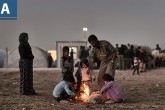In recent weeks, the Asia-Pacific region was on the agenda mostly as a result of the crisis between North Korea and U.S. over a movie called “The Interview,” directed by Seth Rogen and Evan Goldberg. The threats of the North Korean government and hacking of the websites and internet outage in North Korea, demonstrated the potential outcome of a confrontation between the U.S. and North Korea in cyber space. The process of this confrontation and reaction by North Korea, and the cyber operations provided enough material for Hollywood to produce another movie about the relations between the two countries. However, the politics and security of the Asia-Pacific region may face more significant challenges in the coming year that may be more difficult to contain and control, and may generate confrontations that could pull in different regional and global actors.
The crisis in Syria, the fight against ISIS and the negotiations on the nuclear program of Iran are rightfully making the Middle East the center of international attention. However, tensions in the Asia-Pacific region and the absence of effective mechanisms to resolve the differences among the actors, demonstrates that there is always a danger that tensions will escalate and to turn into a major crisis. Some of the issues that can have a direct impact on international security are North Korea, islands in the China Sea, and the direction of the foreign and security policy of China.
One of the most significant problems that could challenge the regional and global security in 2015 is the nuclear program of North Korea. The unknowns about the regime in Pyongyang and the lack of effective communication among North Korea and parties involved provides a fertile ground for potential misunderstandings, misperceptions and misinterpretations. Only a few years after the sudden death of his father, Kim Jong-Un has proven to be as eccentric and difficult, and not quite as easily understood or negotiated with. The absurdity of his propaganda campaign and the horrendousness of some of his political operations within North Korea remind everyone of his father.
In a period where President Obama is following the policy of restoration of ties and dialogue with countries such as Burma, Iran and Cuba, it will be interesting to see if there is a similar development between U.S. and North Korea, and whether they will decide to unclench their fists. More significantly, for the U.S. administration, one of whose most significant priorities is non-proliferation, and for the President who has deeply invested in negotiations with Iran, it will be an important year, and it will be interesting to see how these negotiations will impact U.S. policy towards North Korea and the nonproliferation efforts on this side of the world.
The second significant issue to watch out for in the coming year in the Asia-Pacific region, is the disputes over maritime boundaries in the South China and East China Seas, and the question of the ownership of the islands. Since these issues are very much related with energy security and the control of sea lanes, it will be hard to come up with easy solutions for these crises within 2015. Although, the parties in the dispute have taken important steps to prevent accidental escalation, they may not be able to totally avoid tension among several nations over the Spratly Islands in the South China Sea, or the crisis between China and Japan over Senkaku/Diayou Islands next year. In addition to this, the low intensity crisis involving other islands, including Takeshima and Kuril, may continue in 2015. In addition to the regional dimension, increasing US involvement in these disputes in Asia transforms these issues into global problems.
Finally, there is the question of China, whose next step in its regional and global strategy will directly influence the structure of the international system. In its recent military buildup and economic diplomacy inroads, China is signaling a new, more assertive pattern of behavior, especially in its adjacent r

